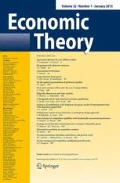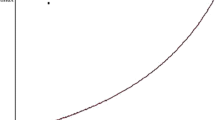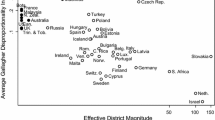Abstract
This paper presents a dynamic model of elections, government formation, and legislation in a parliamentary democracy with proportional representation in which the policy chosen in one period becomes the status quo for the next period. The electorate votes strategically by taking into account the likely governments that parties would form based on their representation and the policies they would choose as a function of the status quo. The status quo thus affects both the election outcomes and the bargaining power of the parties during government formation. A formateur party therefore has incentives to strategically position the current policy to gain an advantage in both the next election and the subsequent bargaining over government formation and policy choice. These incentives can give rise to centrifugal forces that result in policies that are outside the Pareto set of the parties.
Similar content being viewed by others
References
Aghion P., Bolton P.: Government domestic debt and the risk of default: A political-economic model of strategic role of debt. In: Dornbusch, R., Dradhi, M. (eds) Public Debt Management: Theory and History, pp. 121–145. Cambridge University Press, Cambridge (1990)
Austen-Smith D., Banks J.S.: Elections, coalitions, and legislative outcomes. Am Polit Sci Rev 82(2), 405–422 (1988)
Austen-Smith D., Banks J.S.: Positive Political Theory II: Strategy and Structure. The University of Michigan Press, Michigan (2005)
Baron D.P.: A dynamic theory of collective goods programs. Am Polit Sci Rev 90(2), 316–330 (1996)
Baron D.P., Herron M.: A dynamic model of multidimensional collective choice. In: Kollman, K., Miller, J.H., Page, S.E. (eds) Computational Models of Political Economy, pp. 13–47. MIT Press, Cambridge (2003)
Baron D.P., Diermeier D.: Elections, governments, and parliaments in proportional representation systems. Q J Econ 116(3), 933–967 (2001)
Baron, D.P., Hirsch, A.: Common agency lobbying over coalitions and policy. Econ Theory (2011, forthcoming)
Battaglini M., Coate S.: Inefficiency in legislative policy-making: a dynamic analysis. Am Econ Rev 97(1), 118–149 (2007)
Battaglini M., Coate S.: A dynamic theory of public spending, taxation and debt. Am Econ Rev 98(1), 201–236 (2008)
Battaglini, M., Palfrey, T.: The dynamics of distributive politics. Econ Theory (2011, forthcoming)
Bawn K.: Voter responses to electoral complexity: ticket splitting, rational voters and representation in the Federal Republic of Germany. Br J Polit Sci 29(3), 487–505 (1999)
Besley T., Coate S.: Sources of inefficiency in a representative democracy: a dynamic analysis. Am Econ Rev 88(1), 139–156 (1998)
Bowen, R., Zahra, Z.: On dynamic compromise. Manuscript (2007)
Budge I., Klingemann H.-D., Volkens A., Bara J., Tanenbaum E.: Mapping Policy Preferences: Estimates for Parties, Electors, and Governments 1945–1998. Oxford University Press, Oxford (2001)
Cho, S.-J.: Three-party competition in parliamentary democracy with proportional representation. Manuscript (2008)
Cox G.W.: Making Votes Count: Strategic Coordination in the World’s Electoral Systems. Cambridge University Press, Cambridge (1997)
Diermeier D., Eraslan H., Marlo A.: A structural model of government formation. Econometrica 71, 27–70 (2003)
Diermeier D., Feddersen J.T.: Cohesion in legislatures and the vote of confidence procedure. Am Polit Sci Rev 92(3), 611–621 (1998)
Diermeier D., Merlo A.: Government turnover in parliamentary democracies. J Econ Theory 94, 46–79 (2000)
Diermeier D., Merlo A.: An empirical investigation of coalitional bargaining procedures. J Public Econ 88, 783–797 (2004)
Duggan, J., Kalandrakis, A.T.: A dynamic model of legislative bargaining. Manuscript (2007)
Fong, P.: Dynamics of government and policy choice. Manuscript (2006)
Kalandrakis A.: A three-player dynamic majoritarian bargaining game. J Econ Theory 16, 294–322 (2004)
Kalandrakis A.: Regularity of pure strategy equilibrium points in a class of bargaining games. Econ Theory 28(2), 309–329 (2006)
Kalandrakis, A.: Majority rule dynamics with endogenous status quo. Manuscript (2007)
Laver M., Schofield N.: Multiparty Governments: the politics of coalition in Europe. Oxford University Press, Oxford (1990)
Lizzeri A., Persico N.: The provision of public goods under alternative electoral incentives. Am Econ Rev 91, 225–239 (2001)
Persson T., Svensson L.: Why a stubborn conservative would run a deficit: policy with time-inconsistency preferences. Q J Econ 104, 325–345 (1989)
Persson T., Tabellini G.: The size and scope of government: comparative politics with rational politicians . Eur Econ Rev 43, 699–735 (1999)
Persson T., Tabellini G.: Political Economics: Explaining Economic Policies. MIT Press, Cambridge (2000)
Persson T., Tabellini G.: The Economic Effects of Constitutions. MIT Press, Cambridge (2003)
Persson T., Roland G., Tabellini G.: Comparative politics and public finance. J Polit Econ 108(6), 1121–1161 (2000)
Persson T., Roland G., Tabellini G.: Electoral rules and government spending in parliamentary democracies. Q J Polit Sci 2, 155–188 (2007)
Schofield N., Sened I.: Multiparty Democracy: Elections and Legislative Politics. Cambridge University Press, Cambridge (2006)
Strom K.: Minority Government and Majority Rule. Cambridge University Press, Cambridge (1990)
Tabellini G., Alesina A.: Voting on the budget deficit. Am Econ Rev 80(1), 37–49 (1990)
Volpin P.F., Pagano M.: The political economy of corporate governance. Am Econ Rev 95(4), 1005–1030 (2005)
Author information
Authors and Affiliations
Corresponding author
Additional information
Formerly “Policy Dynamics and Inefficiency in a Parliamentary Democracy with Proportional Representation.” Diermeier gratefully acknowledges financial support from the Canadian Institute for Advanced Research (CIFAR). We thank Steve Coate and seminar participants at the meeting of the CIFAR Institutions, Organizations, and Growth group, the NBER Summer Institute, the North American Winter Meeting of the Econometrics Society, Princeton University and Washington University in St. Louis for comments and suggestions.
Rights and permissions
About this article
Cite this article
Baron, D.P., Diermeier, D. & Fong, P. A dynamic theory of parliamentary democracy. Econ Theory 49, 703–738 (2012). https://doi.org/10.1007/s00199-011-0625-7
Received:
Accepted:
Published:
Issue Date:
DOI: https://doi.org/10.1007/s00199-011-0625-7
Keywords
- Parliamentary democracy
- Proportional representation
- Government formation
- Policy dynamics
- Lack of commitment
- Inefficiency




